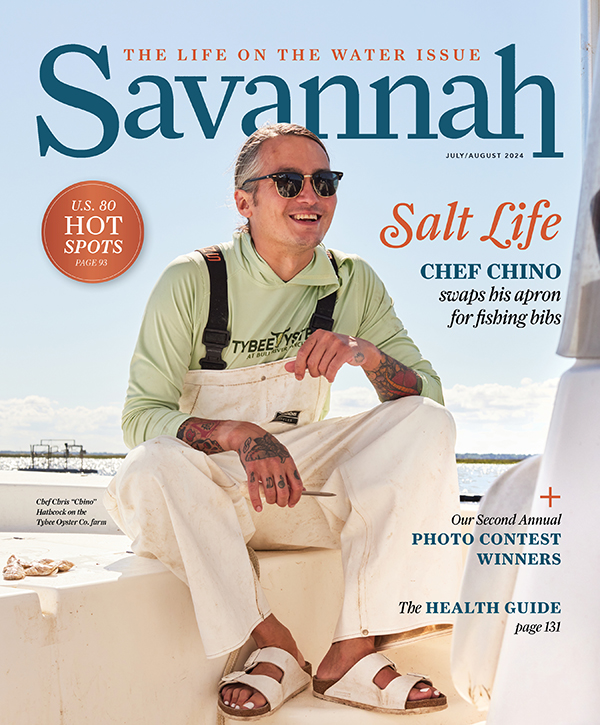Photography by Jon Waits
“Let us pray.” Thus begins Episcopalian minister Jamie Maury’s call to worship each Sunday at the Community of St. Joseph, though some refer to it as the “church in the field.” No stained glass windows or plush velvet-covered pews here—parishioners worship outdoors, in a grassy expanse off Louisville Road on the banks of the Savannah-Ogeechee Canal, adjacent to one of the city’s oldest outdoor homeless camps.
Though Maury’s congregants come from many denominations, they recite the Serenity Prayer in unison before he leads them in a casual Anglican service. They sit on folding chairs; the altar is a simple table covered in white cloth. A choir is accompanied by guitars, a keyboard, violin and trombone.
“By taking services to them, it means we’re serious,” Maury explains. “Plus, many have mobility challenges.” (One parishioner, too ill to move from his nearby tent, listens to the music from across the canal.) Before Holy Communion, Maury invites congregants to share prayer requests aloud. “It’s a little more charismatic, and in some ways, the best part of the service,” he says of giving the congregation an opportunity to collectively offer up their pain—and joy.
On October 4, 2015, less than 20 people attended the inaugural service. Two years on, attendance has nearly tripled, with most newcomers among the city’s homeless population.
As a gay man and an Ivy League graduate, Maury is an unlikely candidate to be leading Sunday services under a bridge in Savannah, where temperatures in August exceed 90 degrees. But he doesn’t care. At 73, he’s finally realized his lifelong dream.

Growing up in a middle-class family in Alabama, Maury first felt called to the priesthood as a response to the poverty, racism and “unfair exercise of power” he witnessed during the 1950s.
He filled his life with religious activity, attending two church services every Sunday—first an Episcopal service with his grandfather at 7:30 a.m., then a Presbyterian one with his parents. He played organ for both Methodist and Catholic churches. At 13, he joined the Episcopal denomination. His instinct to turn to religion as a means of community service may have been genetic: his great-grandfather, an Anglican priest, once taught Thomas Jefferson at a boarding school in Charlottesville, Virginia.
In 1962, Maury enrolled at the University of Alabama, and shortly thereafter confessed two things to a campus priest: that he wished to be ordained, and that he was gay.
“The priest told me not to tell anyone, but I knew I couldn’t lie to God about this,” Maury says. Though he was disappointed in the exclusion of openly gay individuals from the priesthood, Maury accepted his fate.

After graduation, he taught high school biology. He was admitted to a master’s program in social work, and just before he was to enroll, he was drafted into the army and assigned to a computer messaging center in Vietnam. An Episcopal priest visited every six weeks. Amid rocket and mortar attacks, Maury continued to hear the call.
Forty years passed. He earned a Ph.D. in clinical social work and became an army social worker, stationed up and down the East Coast and abroad. In 1978, he met architect Dan Snyder. When Maury retired from the army a decade later, he and Snyder moved to Savannah, where Maury worked as the director of a substance abuse clinic before renewing his request for ordination. He was turned down twice—in 2000 and again in 2006—because the Episcopal Diocese of Georgia’s canon precluded ordination of partnered gays.
But change was rumbling in the rest of the world: On October 7, 2008, Maury and Snyder were married at San Francisco’s City Hall amid California’s pioneering struggle for marriage equality. (Maury recalls with fondness the commissioner who performed the ceremony—he and his wife were also celebrating their 30th anniversary.) In 2010, Georgia’s Episcopal Diocese elected a progressive new bishop, Scott Benhase, who pledged to support ordination of gay clergy by removing a canon which prevented it. Then Maury was accepted to Yale Divinity School. He knew he’d be near retirement age upon graduation and might never be ordained, but buoyed by hope and faith, he went anyway.
Bishop Benhase held fast to his promise. In 2013, the Episcopal Diocese of Georgia approved a new resolution, and the canon was changed. Maury was ordained in 2015. The next step was easy. He’d spent his whole life thinking about it.

Maury, Snyder and other parishioners arrive at 8 a.m. each Sunday and unload chairs from Maury’s truck. They set out a McDonald’s breakfast, along with clothes, shoes and other supplies donated during the week by community members. Maury tithes every dollar of his personal IRA, plus his small stipend from the church.
Some parishioners walk miles to attend. Others bike. Another group travels across the canal. Maury is undeterred by the theft of bicycles and other provisions distributed to congregants—a never-ending stream of loss, he says—because each week the faithful return.
“He has a huge heart,” says homeless congregant William Warren. “It would take the rest of the day for me to say everything he’s done for me. It’s fulfilling being a part of something.” Maury worries about the future of the church once he retires, but he’s already working on a plan. When asked if he’s angry it took so long to gain the right to do the work he always wanted, he shakes his head.
“My time is now,” he says.
The number of homeless residents in Chatham County exceeds 4,500. “The main thing homeless people need is permanent housing,” says Cindy Kelley, director of the Chatham-Savannah Authority for the Homeless. But they can also use food—for sustenance and for the soul. To donate time or money to the Community of St. Joseph, email Father Jamie Maury at [email protected]. To donate money to Savannah’s first tiny house village for homeless veterans, visit homelessauthority.org.



